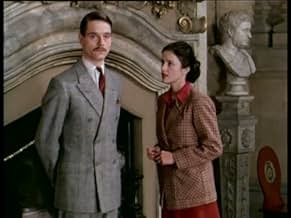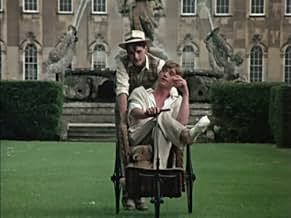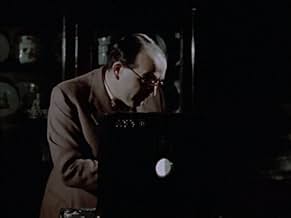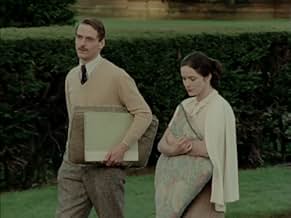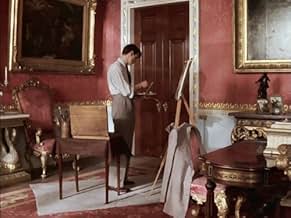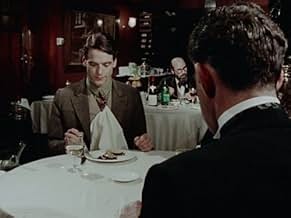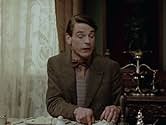अपनी भाषा में प्लॉट जोड़ेंThe life, friendships and romances of the protagonist Charles Ryder-including his friendship with the Flytes, a family of wealthy English Catholics who live in a palatial mansion called Brid... सभी पढ़ेंThe life, friendships and romances of the protagonist Charles Ryder-including his friendship with the Flytes, a family of wealthy English Catholics who live in a palatial mansion called Brideshead Castle.The life, friendships and romances of the protagonist Charles Ryder-including his friendship with the Flytes, a family of wealthy English Catholics who live in a palatial mansion called Brideshead Castle.
- 1 प्राइमटाइम एमी जीते
- 13 जीत और कुल 19 नामांकन
एपिसोड ब्राउज़ करें
फ़ीचर्ड समीक्षाएं
The reviewers who have given positive feedback for this series have done quite well and I have little to add. Sadly, there was one review that seemed to miss the point, and I would like to address this:
"We can suppose that Lord Marchmain pretended to convert to comfort his family. There is no such excuse for Charles, who has seen the damage that Catholicism did to the whole family."
Wrong. It was the shirking of religious principle that tore apart the family. Lord Marchmain left Catholicism and thought he had license to leave his wife, so he abandoned his children to a confused, fatherless upbringing. Had he remained true to his sacramental vow to stay, "for better or for worse," by his wife's side, the family would never have been so dysfunctional.
As for the vague homo-eroticism in the first few episodes, many young men at Oxford back in the day did go through such phases and often they were in fact merely PHASES. Evelyn Waugh himself apparently did.
"We can suppose that Lord Marchmain pretended to convert to comfort his family. There is no such excuse for Charles, who has seen the damage that Catholicism did to the whole family."
Wrong. It was the shirking of religious principle that tore apart the family. Lord Marchmain left Catholicism and thought he had license to leave his wife, so he abandoned his children to a confused, fatherless upbringing. Had he remained true to his sacramental vow to stay, "for better or for worse," by his wife's side, the family would never have been so dysfunctional.
As for the vague homo-eroticism in the first few episodes, many young men at Oxford back in the day did go through such phases and often they were in fact merely PHASES. Evelyn Waugh himself apparently did.
Evelyn Waugh's 'Brideshead Revisited' is, I think, the quintessential and the finest novel of the twentieth century - English literature at its highest form. And this 1981 miniseries does the novel great justice: its episodes give us television's finest hours.
The splendid cast makes the most of the rich script, which is as faithful to a novel as a script can be. My favorite is Phoebe Nicholls as Lady Cordelia: her performance is disarming, utterly charming. And Nickolas Grace plays to the hilt the sybaritic, viper-tongued Anthony Blanche.
Jeremy Irons does sterling service as the narrator, Charles Ryder, who is, after all, Waugh's observant eye and eloquent tongue; Irons depicts poignantly Ryder's "conversion to the Baroque" crashing to bits against the cold gracelessness of "The Age of Hooper". As the rapidly dissolving Lord Sebastian Flyte Anthony Andrews is memorable - should Waugh's book ever again be adapted for the screen the lot of the actor cast as Sebastian will not be enviable.
Claire Bloom's Lady Marchmain is a study in quiet dignity upheld vainly in the face of the twentieth century's ravaging of her character's world and sensibilities. Sir Laurence Olivier's Lord Marchmain is letter-perfect; and in the deathbed sequences Olivier's performance is tenderly, expertly nuanced.
Diana Quick was a bit too old to play convincingly the debutante Lady Julia of the early episodes, but in the later ones Quick hits perfectly every disillusioned, jaded, repentant note. Charles Keating as Rex, who inhabits a "harsh acquisitive world", is an exemplar of shallowness, of the venality Waugh detested - and satirized so hilariously in his earlier novels: he's nothing more than a Hooper with money and ambition.
Simon Jones gives us Bridey's stodginess and bewliderment with marvelous understatement. John Gielgud steals every scene as Charles's father Edward, brilliantly interpreting of one of Waugh's most delicious, yet indigestible characters.
There are rich offerings, too, from character actors: Stephane Audran glows warmly as Clara, Lord Marchmain's insightful, intuitive, down-to-earth mistress; John LeMesurier leaves us suitably agape as the Jesuit Father Mowbray baffled and dismayed by Rex's utilitarian approach to his conversion to Catholicism; Jeremy Sinden sails naively along as the indefatigable yet ever-dimwitted and clueless Boy Mulcaster; Ronald Fraser stirs just the right sloshing of queasiness as the peculiar, opportunistic shipboard cocktail party guest; Jonathan Coy, as the parlous, seedy Kurt, is perfectly repellent; Jane Asher tiptoes delicately through Celia Ryder's conventional, porcelain sensibilities; and Mona Washbourne knits a thoughtful, lovely portrait of Nanny Hawkins.
Throughout 'Brideshead Revisited' the photography is lush, meticulous, yet tasteful. The score is understated, never intrusive, always complementary. Costuming, set design and, above all, location, are unrivalled. Charles Sturridge's direction is evenhanded, assured - and his pacing of the narrative treads adroitly every beautifully-modulated beat.
I bought the DVD version of this series and, though occasional bits of the image transfer are a trifle fuzzy and the sound re-recording is sometimes uneven, the nicely boxed set of discs pleased - and goes on pleasing - me greatly.
In the early third millennium, a time of evermore immature programming and production executives - a dismal age of TV's Hoopers, I have to suspect sadly that television will never again attain the heights to which 'Brideshead Revisited' vaulted. But I shall remain ever grateful for this magnificent series.
The splendid cast makes the most of the rich script, which is as faithful to a novel as a script can be. My favorite is Phoebe Nicholls as Lady Cordelia: her performance is disarming, utterly charming. And Nickolas Grace plays to the hilt the sybaritic, viper-tongued Anthony Blanche.
Jeremy Irons does sterling service as the narrator, Charles Ryder, who is, after all, Waugh's observant eye and eloquent tongue; Irons depicts poignantly Ryder's "conversion to the Baroque" crashing to bits against the cold gracelessness of "The Age of Hooper". As the rapidly dissolving Lord Sebastian Flyte Anthony Andrews is memorable - should Waugh's book ever again be adapted for the screen the lot of the actor cast as Sebastian will not be enviable.
Claire Bloom's Lady Marchmain is a study in quiet dignity upheld vainly in the face of the twentieth century's ravaging of her character's world and sensibilities. Sir Laurence Olivier's Lord Marchmain is letter-perfect; and in the deathbed sequences Olivier's performance is tenderly, expertly nuanced.
Diana Quick was a bit too old to play convincingly the debutante Lady Julia of the early episodes, but in the later ones Quick hits perfectly every disillusioned, jaded, repentant note. Charles Keating as Rex, who inhabits a "harsh acquisitive world", is an exemplar of shallowness, of the venality Waugh detested - and satirized so hilariously in his earlier novels: he's nothing more than a Hooper with money and ambition.
Simon Jones gives us Bridey's stodginess and bewliderment with marvelous understatement. John Gielgud steals every scene as Charles's father Edward, brilliantly interpreting of one of Waugh's most delicious, yet indigestible characters.
There are rich offerings, too, from character actors: Stephane Audran glows warmly as Clara, Lord Marchmain's insightful, intuitive, down-to-earth mistress; John LeMesurier leaves us suitably agape as the Jesuit Father Mowbray baffled and dismayed by Rex's utilitarian approach to his conversion to Catholicism; Jeremy Sinden sails naively along as the indefatigable yet ever-dimwitted and clueless Boy Mulcaster; Ronald Fraser stirs just the right sloshing of queasiness as the peculiar, opportunistic shipboard cocktail party guest; Jonathan Coy, as the parlous, seedy Kurt, is perfectly repellent; Jane Asher tiptoes delicately through Celia Ryder's conventional, porcelain sensibilities; and Mona Washbourne knits a thoughtful, lovely portrait of Nanny Hawkins.
Throughout 'Brideshead Revisited' the photography is lush, meticulous, yet tasteful. The score is understated, never intrusive, always complementary. Costuming, set design and, above all, location, are unrivalled. Charles Sturridge's direction is evenhanded, assured - and his pacing of the narrative treads adroitly every beautifully-modulated beat.
I bought the DVD version of this series and, though occasional bits of the image transfer are a trifle fuzzy and the sound re-recording is sometimes uneven, the nicely boxed set of discs pleased - and goes on pleasing - me greatly.
In the early third millennium, a time of evermore immature programming and production executives - a dismal age of TV's Hoopers, I have to suspect sadly that television will never again attain the heights to which 'Brideshead Revisited' vaulted. But I shall remain ever grateful for this magnificent series.
The book and the mini-series always broke my heart. I first read the book and viewed the series as a teenager and it affected me much more then "Catcher in the Rye".
It is probably one of the finest adaptations of a novel put to film. You watch as the reckless innocent fun of youth is slowly taken away and replaced by sad old cynicism.
It captures the feeling of the stolen season of peace between the world wars and the cool observant eye of Waugh who before hand always wrote detached speedy amoral stories. This seemed so...different.
The acting is so on the spot. Carefully restrained and woeful as we watch our favorite characters grow.
It is probably one of the finest adaptations of a novel put to film. You watch as the reckless innocent fun of youth is slowly taken away and replaced by sad old cynicism.
It captures the feeling of the stolen season of peace between the world wars and the cool observant eye of Waugh who before hand always wrote detached speedy amoral stories. This seemed so...different.
The acting is so on the spot. Carefully restrained and woeful as we watch our favorite characters grow.
A dream cast with a magnificent script (John Mortimer) brings to life Evelyn Waugh's elegiac upon the between-wars years. Golden years and golden people are lost, and the sense of loss is captured in the changes inflicted on the buildings, and in Geoffrey Burgon's heart-wrenching score. Brideshead captures the clash of humanistic values with those of old-time Catholicism, while tracing the decline of an aristocratic (somewhat precious) family, in a series that is part comedy, part romance, part tragedy. It is an enriching experience that no-one should miss.
The adaptation is so good that one can read Waugh's novel while watching and practically not miss a word. The lush prose of the novel is there, as well as perfect visual imagery of the settings, absolutely essential to the integrity of the piece.
क्या आपको पता है
- ट्रिवियाOriginally, producer Derek Granger asked Anthony Andrews to play the role of Charles Ryder. Andrews, however, felt he was better suited for the part of Sebastian Flyte. Jeremy Irons, Granger's first choice for Sebastian, preferred to play Ryder, so the two actors swapped roles.
- इसके अलावा अन्य वर्जनThe voiceover in the early Venice sequences was added for the American version after producer Derek Granger saw the initial British broadcast and felt there was not a strong enough sense of the religious feelings evoked while viewing the paintings.
- कनेक्शनFeatured in The 34th Annual Primetime Emmy Awards (1982)
टॉप पसंद
रेटिंग देने के लिए साइन-इन करें और वैयक्तिकृत सुझावों के लिए वॉचलिस्ट करें
विवरण
- रिलीज़ की तारीख़
- कंट्री ऑफ़ ओरिजिन
- भाषा
- इस रूप में भी जाना जाता है
- Wiedersehen mit Brideshead
- फ़िल्माने की जगहें
- Castle Howard, Henderskelfe, York, North Yorkshire, इंग्लैंड, यूनाइटेड किंगडम(Brideshead Castle: exterior and some interiors)
- उत्पादन कंपनी
- IMDbPro पर और कंपनी क्रेडिट देखें
इस पेज में योगदान दें
किसी बदलाव का सुझाव दें या अनुपलब्ध कॉन्टेंट जोड़ें





